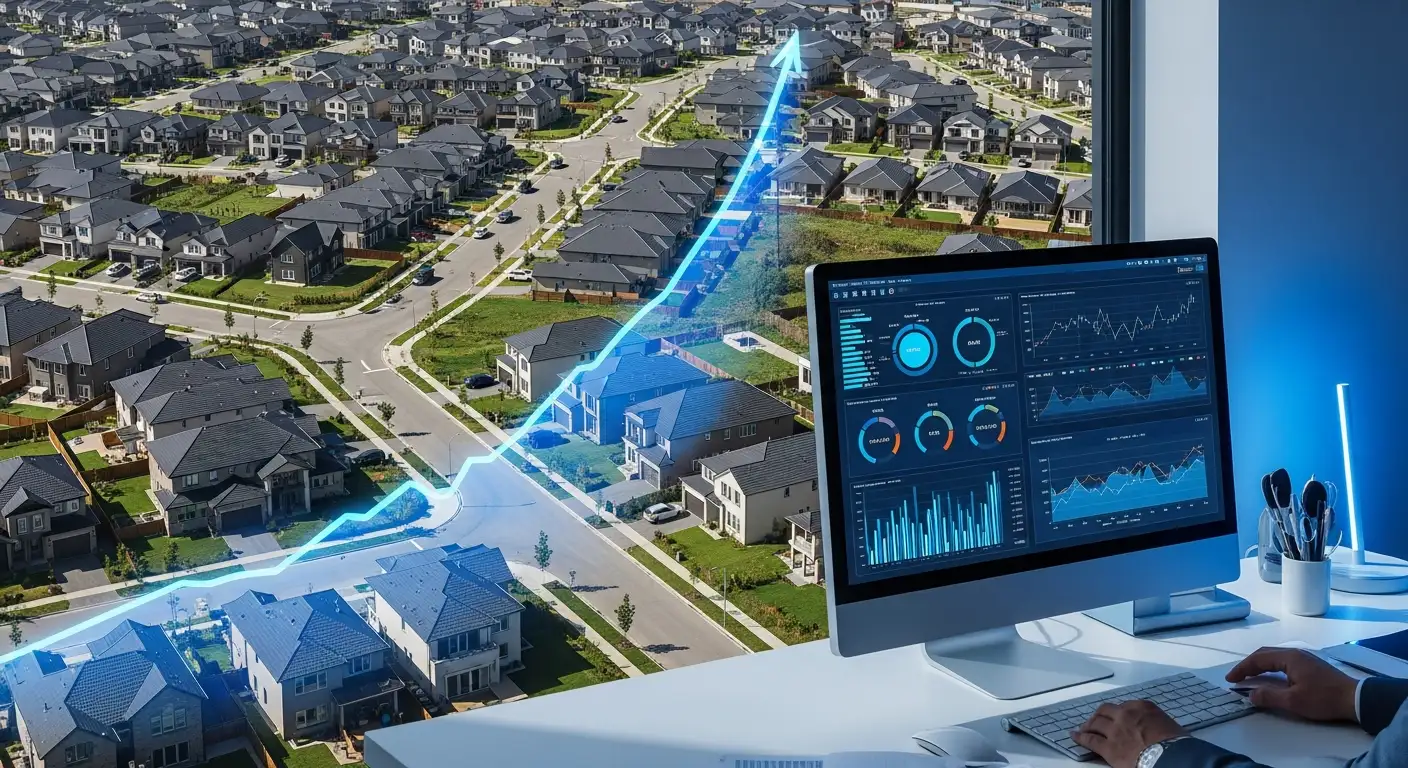Understanding the Truth About Mortgage Refinancing
Mortgage refinancing is a common financial strategy for homeowners seeking better terms, lower payments, or access to home equity. However, numerous myths and misconceptions can cloud judgment, leading some to either overestimate its benefits or avoid it altogether. This article aims to dispel these myths, provide accurate insights into the refinancing process, and help homeowners make well-informed decisions.
What Is Mortgage Refinancing and How Does It Work?

What is mortgage refinancing and how does it work?
Mortgage refinancing is the process of replacing your existing home loan with a new loan that offers better terms. It can lower your interest rate, change your loan length, or switch from an adjustable to a fixed-rate mortgage, helping you meet your financial goals.
The process involves several steps. First, you assess your financial situation—check your credit, home equity, and income. Shopping around for different lenders is crucial, as rates and terms vary. You’ll need to gather documents like pay stubs, tax returns, and bank statements.
An important part of refinancing is a home appraisal, which determines your home’s current value. After reviewing offers from multiple lenders, you choose the best one and proceed to close.
Closing costs typically range from 2% to 5% of the loan amount and include fees for legal work, appraisals, and other services. Sometimes, these costs can be rolled into your new loan or offset with a lender credit.
Refinancing can reduce monthly payments, lower overall interest costs—potentially saving tens of thousands over the life of the loan—and give access to cash through cash-out refinancing. It also allows you to modify your loan type, such as switching to a shorter term or locking in a fixed rate.
While there are initial costs, refinancing can be a strategic move for better financial stability or to fund major expenses. It’s advised to do the math to ensure the potential savings outweigh the upfront costs.
In summary, mortgage refinancing is a financial tool that can improve your mortgage terms, reduce payments, and give you greater flexibility, all while involving a thorough application and approval process.
The Impact of Interest Rates on Refinancing Decisions
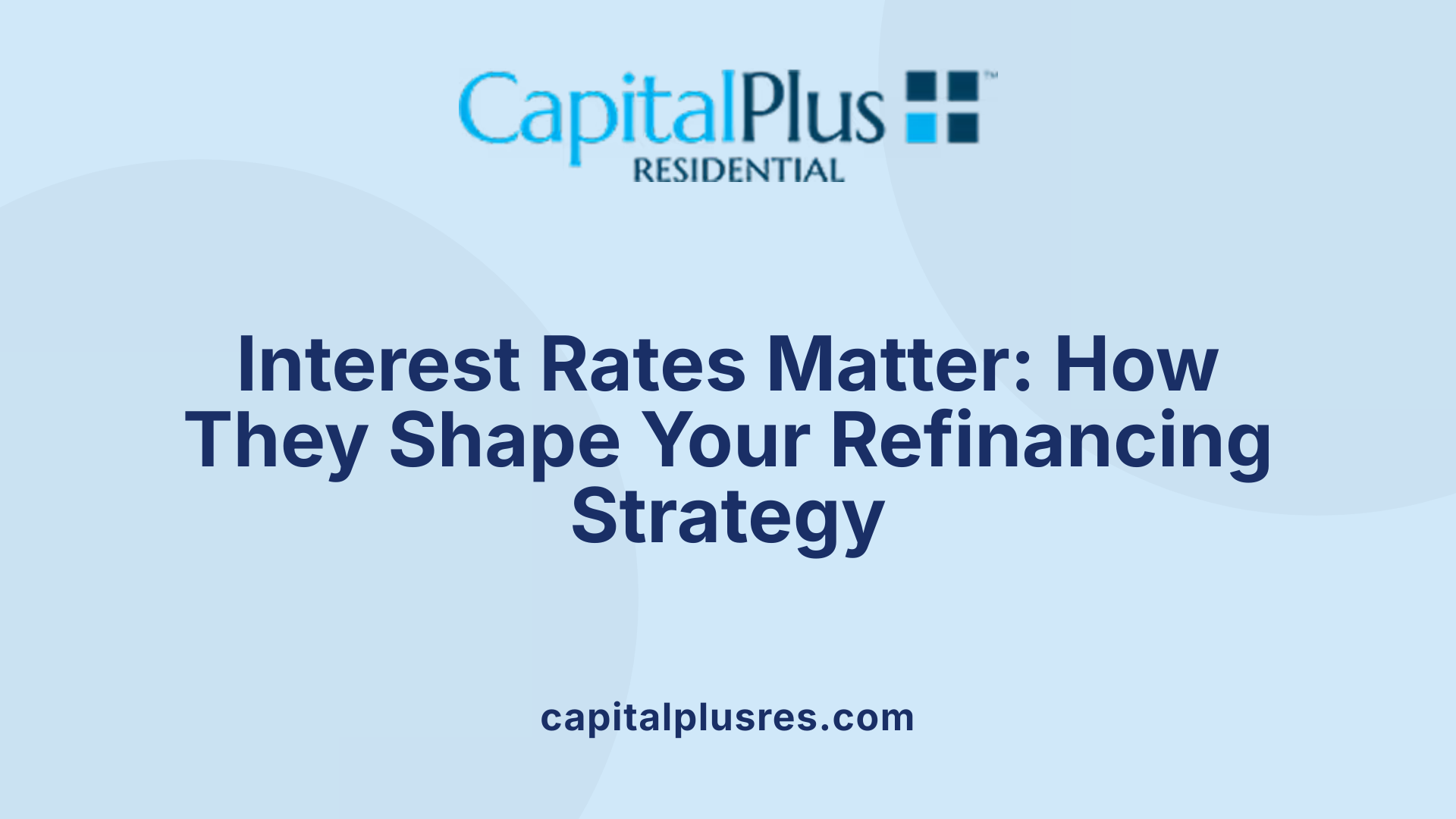
How do interest rates influence refinancing?
Interest rates play a pivotal role in mortgage refinancing choices. When interest rates decrease, the new loan may come with lower monthly payments and less interest paid over the loan’s duration. This potential saving makes refinancing especially appealing if the rate drops significantly below the existing rate.
However, the decision isn’t just about current rates. Borrowers must also consider the costs involved in refinancing, such as closing costs and fees, and evaluate the break-even point—when the savings outweigh the initial expenses.
Economic conditions, loan types, and borrower credit profiles also influence available rates. Fixed-rate, adjustable-rate, VA, and jumbo loans each have different rate options based on market trends and individual eligibility. Hence, shopping around and improving credit scores can help secure more favorable terms.
How can you calculate potential savings?
To determine if refinancing is beneficial, borrowers should compare the current mortgage rate with prevailing rates. Calculating potential savings involves estimating your new monthly payment, subtracting your current payment, and then considering refinancing costs.
A simple way to analyze this is to examine the break-even point: divide the total closing costs by the monthly savings. If the break-even point fits within your planned time in the home, refinancing could be advantageous.
What market factors affect refinancing rates?
Refinancing rates are sensitive to broader economic indicators such as federal reserve policy, inflation rates, and bond market performance. When the economy is stable or growing, rates tend to be higher; conversely, during economic downturns or periods of low inflation, rates often decline.
Additionally, lender-specific factors like competition, borrower qualifications, and loan programs influence the rates offered. Staying informed about market trends and consulting with financial advisors can help you time your refinance for optimal savings.
| Aspect | Description | Additional Details |
|---|---|---|
| Rate Fluctuations | Affects monthly payments and total interest | Lower rates = potential savings |
| Economic Indicators | Fed policies, inflation impact rates | Market trends influence available loans |
| Borrower Factors | Credit score, equity, income | Better financial health can secure lower rates |
| Loan Type | Fixed vs. adjustable, government-backed | Different terms and eligibility |
| Timing | Market conditions and personal readiness | Better timing can increase savings |
Understanding how interest rates influence your refinancing options helps you decide when and if refinancing aligns with your financial goals. Regularly monitoring market trends, evaluating costs, and considering personal circumstances will ensure you make informed, strategic decisions about your home loan.
Navigating the Financing Timeline and Costs
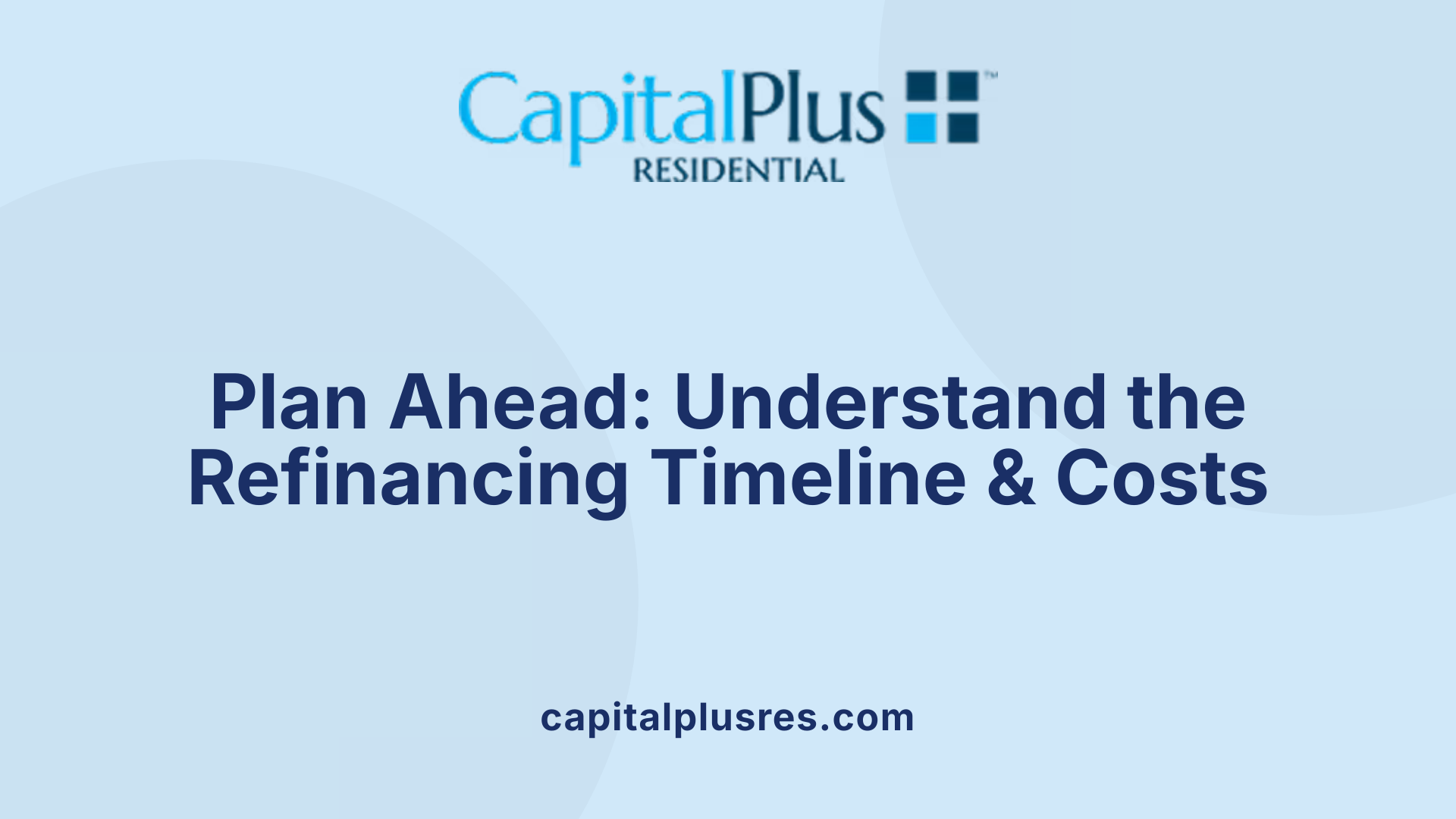
How long does the mortgage refinancing process take?
The mortgage refinancing process typically takes between 30 and 50 days, although this can vary depending on various factors such as the type of loan, the lender’s workload, and how prepared the borrower is.
Initially, the process involves gathering necessary documents, which include proof of income, credit information, and home details. Once the application is submitted, the lender proceeds with processing and underwriting, which assess the borrower’s financial health.
An important step is the appraisal, which determines the current value of the property. Depending on the complexity of the case and specific lender requirements, refinancing can close faster or take longer.
For simpler refinancing applications, such as those involving streamlined FHA or VA programs, closing might occur as quickly as 15 to 20 days. More complex cases—particularly those with lower credit scores or unique property issues—could extend to 60 or even 90 days.
Delays often happen due to administrative procedures, appraisal scheduling, or property-specific factors. To speed up the process, borrowers who prepare all necessary documentation and work with efficient lenders tend to see quicker closings.
In general, most refinancing transactions conclude within about 5 to 7 weeks, making it manageable with proper planning and timing.
| Aspect | Typical Duration | Additional Notes |
|---|---|---|
| Standard refinancing | 30-50 days | Varies with complexity and lender efficiency |
| FHA/VA streamline | 15-45 days | Usually faster, but depends on case specifics |
| Delays possible | Up to 90 days | Due to appraisals, documentation, or administrative issues |
Understanding this timeline helps homeowners plan effectively, ensuring they meet their financial goals without unnecessary stress.
Breaking Down Common Misconceptions and Myths
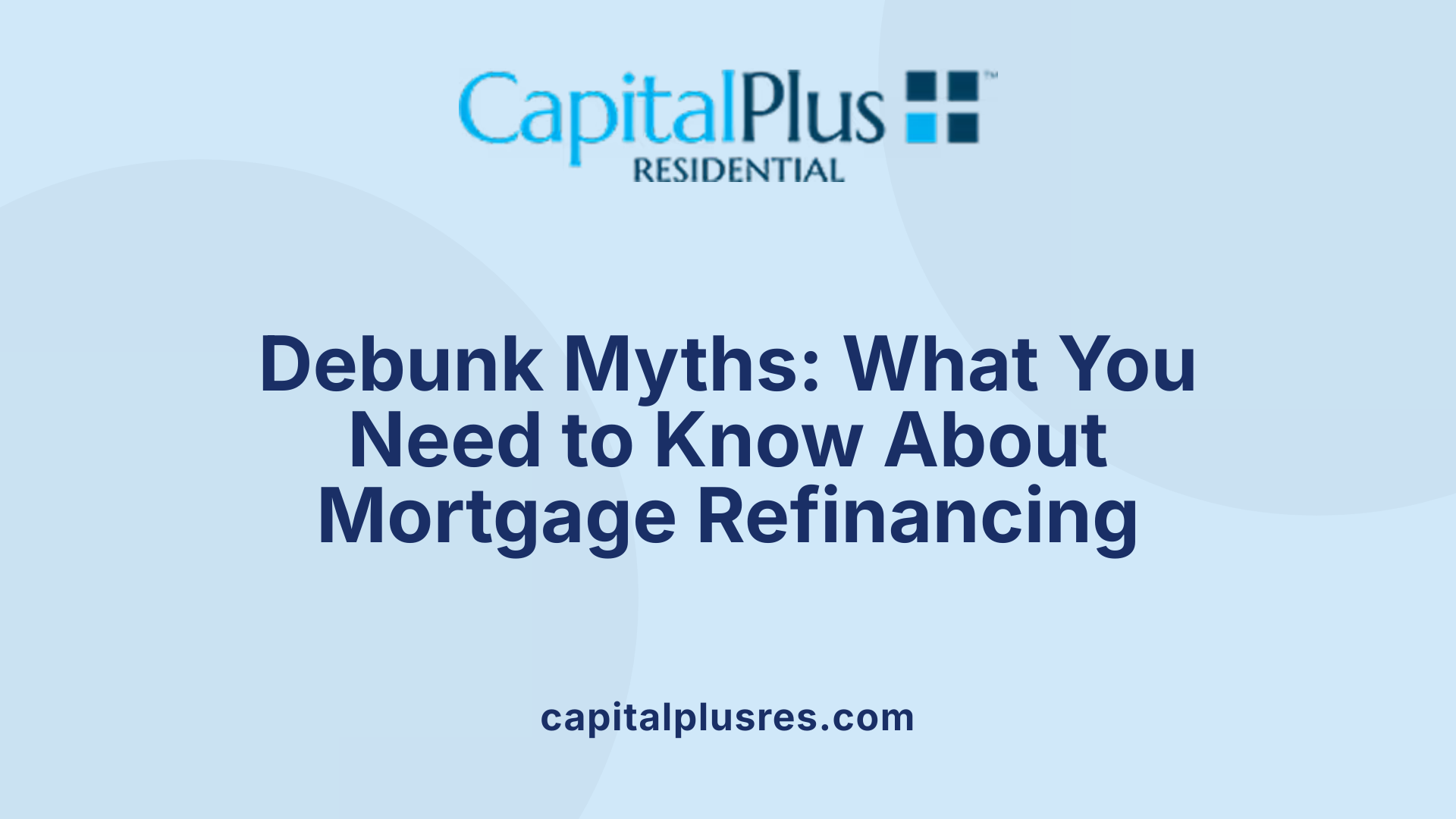
Are there any common myths about mortgage refinancing?
Yes, numerous misconceptions surround mortgage refinancing, which can hinder homeowners from taking advantage of its benefits. One prevailing myth is that refinancing always results in lower monthly payments. While it can, it depends on factors like interest rates and loan terms. Some believe refinancing is free or involves no costs; however, closing costs often range from 2% to 5% of the loan amount and may be rolled into the new mortgage.
Another widespread myth is that a home must have at least 20% equity to refinance. In reality, this isn’t always the case. Programs like FHA loans require just 3.5% equity, VA loans often require no down payment, and USDA loans also offer low or no down payment options. Moreover, options like the Home Affordable Refinance Program (HARP) initially allowed refinancing with up to 125% loan-to-value ratios, making it possible to refinance even with little or no equity.
Many assume refinancing is only advantageous when interest rates decline significantly. However, refinancing can also help reduce monthly payments, switch from adjustable-rate to fixed-rate loans, or access cash for home improvements or other needs.
It is also thought that refinancing is a complicated or lengthy process exclusive to the current lender. In truth, the process has become more streamlined thanks to technology, and shopping around often reveals better terms offered by different lenders.
Understanding these myths is vital for homeowners to make informed decisions. Exploration and consultation with mortgage professionals can reveal opportunities that might otherwise be overlooked, regardless of specific home equity or initial fears.
| Myth or Misconception | Reality | Additional Details |
|---|---|---|
| Must have 20% equity to refinance | No, less than 20% is possible with certain loan programs | FHA (3.5%), VA (none), USDA (low/no down payment) |
| Refinance is free | No, closing costs apply but can sometimes be rolled into the loan | Costs vary, 2%-5% of mortgage amount |
| Refinancing only benefits when interest rates drop | Not always; can be used for payments, equity, or loan terms | Strategic refinancing can still be valuable |
| Only the current lender can offer refinancing | Different lenders offer diverse options | Shopping around benefits borrowers |
| Refinancing is complicated | Technology has simplified process | Standard documents and steps are manageable |
Seeking accurate information dispels myths and empowers homeowners to utilize refinancing strategically and confidently.
Strategic Benefits and When to Refinance
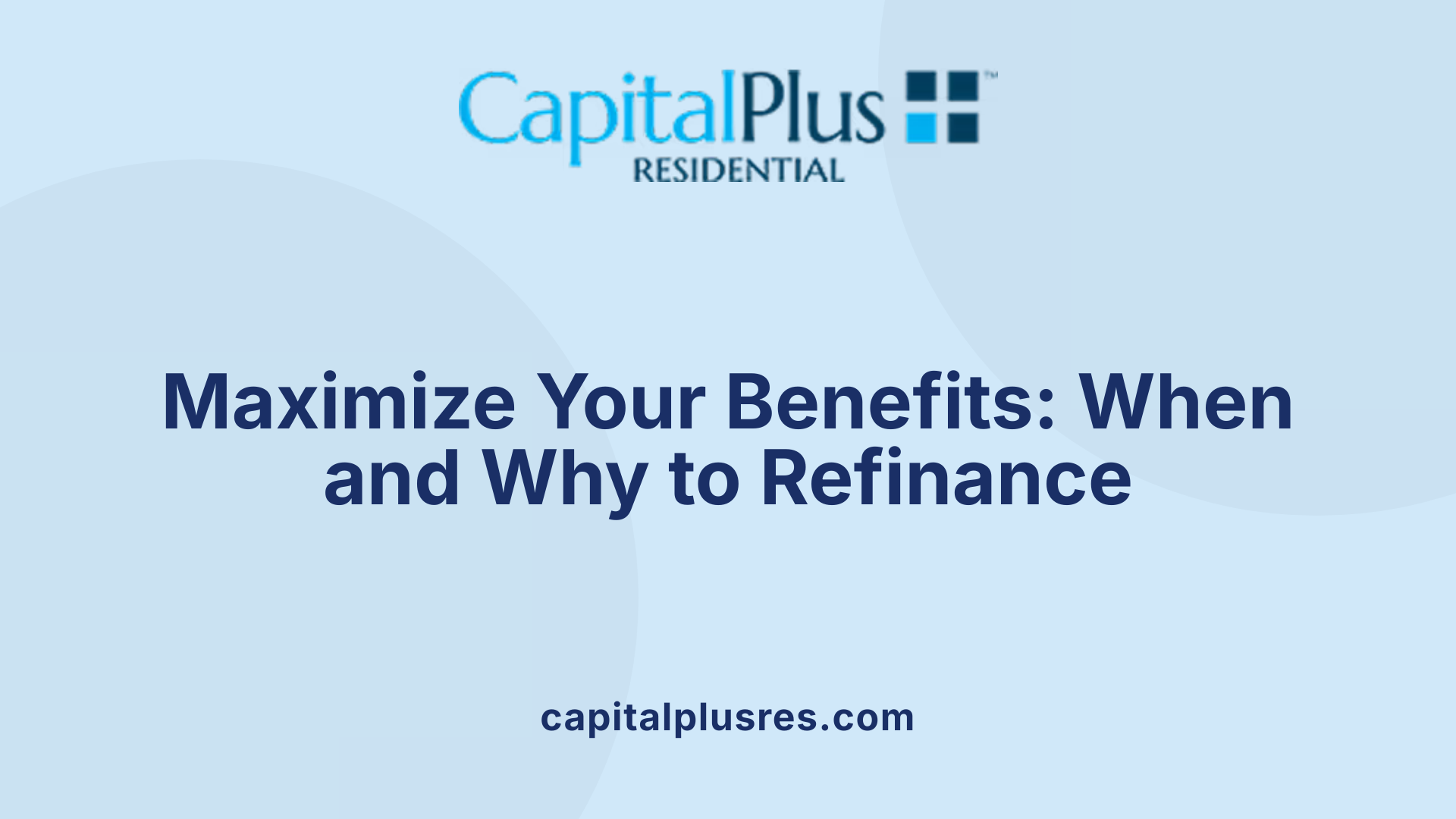
Can refinancing help me pay off my mortgage faster?
Refinancing can indeed help you pay off your mortgage more quickly, especially if you opt for a shorter loan term, such as switching from a 30-year to a 15-year mortgage. When current interest rates are lower, refinancing to a shorter term can significantly reduce the amount of interest paid over the life of the loan.
In addition to refinancing, making extra payments toward the principal—whether monthly or as a lump sum—can shorten your loan duration without additional refinancing costs. This approach allows you to build equity faster and pay off your home sooner.
However, keep in mind that refinancing involves initial costs, including closing fees and other expenses. It’s important to calculate your break-even point—the time needed to recover the upfront costs through lower monthly payments and interest savings—and determine whether you will stay in your home long enough to benefit financially.
If you are close to paying off your mortgage, refinancing might not make sense unless it offers a lower interest rate and a manageable timeframe to recover your costs. Your personal financial situation, future plans, and ability to make extra payments all influence whether refinancing is the right choice to accelerate your payoff.
Ultimately, whether to refinance for faster payoff depends on balancing potential savings against the upfront cost and your long-term homeownership plans.
Additional insights
Refinancing isn't always aimed at paying off your mortgage early; it’s also frequently used to lower monthly payments, access home equity, or switch to a different type of loan. Shopping around and consulting with a financial advisor can help you determine the most advantageous move based on your specific goals.
For more information, searching for "Refinancing to pay off mortgage early" can provide personalized strategies and recent trends that align with your financial objectives.
Making an Informed Decision
Mortgage refinancing can be a valuable tool for improving your financial situation, but it is essential to separate myths from facts. Understanding the actual process, costs, and potential benefits helps you determine whether refinancing aligns with your goals. Shopping around, evaluating interest rates, and consulting professionals can pave the way to a smarter financial move. Remember, refinancing is not a one-size-fits-all solution; it requires careful assessment of your circumstances, future plans, and market conditions to ensure it truly works in your favor.
References
- 6 Mortgage Refinance Myths-Busted!
- Debunking Refinancing Myths: Guide for Home Loan ...
- Mortgage Myths Debunked
- 7 Common Misconceptions About Mortgage Refinancing
- Myths About Refinancing a Mortgage
- Refinancing Myths Debunked: What Homeowners Need to ...
- 6 Biggest Myths About Mortgage Refinance
- Does Refinancing A Mortgage Impact Credit Scores?
- How Does Refinancing a Loan Affect My FICO Scores?


